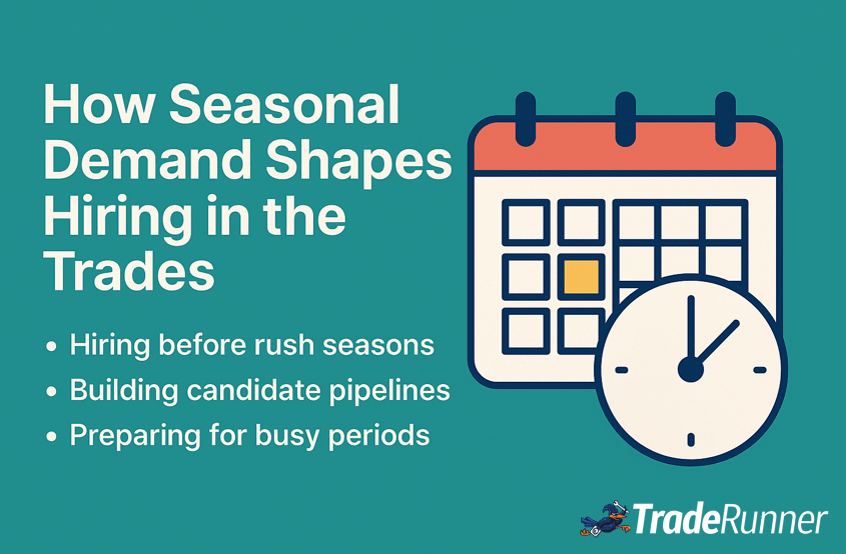
How Seasonal Demand Affects Hiring in the Trades
Why hiring is a year-round process that will keep you prepared for busy season. If you're hiring urgently because busy season has started, it's already too late.
How Seasonal Demand Affects Hiring in the Trades
Why hiring is a year-round process that will keep you prepared for busy season. If you're hiring urgently because busy season has started, it's already too late.
How Seasonal Demand Affects Hiring in the Trades
Last August, my buddy ranted to me about how his company's service van broke down in a customer's driveway during a 98-degree heat wave. The tech was their only available guy that day, and they had twelve more calls waiting. That's what happens when you don't plan for seasonal hiring.
Every business owner in the trades knows the feeling. One day you're telling techs to slow down, the next you're fielding angry calls because you can't get to someone's broken AC for three days.
The Reality of Seasonal Staffing
I learned this lesson the hard way during my third year running a small HVAC company. We had four solid techs in April - felt like plenty. By July, I was personally running service calls because we were drowning. Our average response time went from same-day to four days, and we lost three long-term commercial accounts that summer.
The problem wasn't just being busy. It was that every other company in town was also scrambling to hire, which meant:
- Qualified techs were asking for $5-10 more per hour than in spring
- Good candidates already had jobs
- New hires needed training during our busiest weeks
- We were interviewing people at 7 PM because that's when we finished calls
Now I start my hiring process in March, even when it feels unnecessary.
What Actually Works
Here's my current approach, developed after several painful seasons:
Track your patterns first. I pull reports every February showing when call volume spiked last year, which types of calls dominated, and how many overtime hours we logged each month. Last year, our residential AC calls tripled between May 15th and June 30th.
Start conversations early. In March, I reach out to techs who might be looking for summer work – maybe they're with a heating-focused company, or they want to pick up weekend shifts. I'm not necessarily hiring yet, just building relationships.
Use your slow season for trials. February and March are perfect for having potential hires shadow experienced techs. They learn our systems when we have time to teach, and we can evaluate them without the pressure of emergency calls. It’s best to be aggressive with hires before busy season.
I also keep a running list of people who applied during busy season but we couldn't properly interview. Come spring, I circle back to see if they're still available.
Managing the Pipeline
One thing that changed everything for me was treating hiring like a year-round process instead of a seasonal emergency. I use TradeRunner to stay organized because honestly, I was losing track of candidates in spreadsheets.
The platform allows me to:
- Get immediate access to qualified techs who are interview-ready
- Save time & money not posting jobs, reviewing applications, or playing phone tag
- Set reminders to follow up with promising candidates during off-season
- Keep notes on each person's experience level and availability
I've got a "summer prospects" list that I revisit every spring. Some of the best hires I've made were people I first talked to the previous year.
The Bottom Line
You can't eliminate the seasonal crunch –people's ACs will always break during heat waves. But you can control how you prepare for it.
My current team is double the size it was five years ago, but my stress level during busy season is actually lower. When you have the right people in place before you desperately need them, everything else gets easier.
The companies that struggle every summer are the ones still treating hiring like something you do when you're already behind. Start early, stay organized, and remember that good techs have options – especially during busy season.
